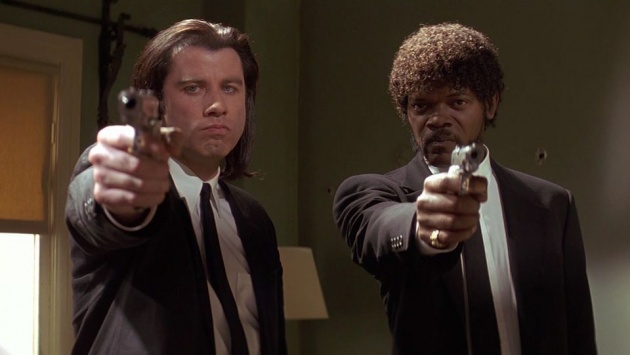
A.A. Dowd over at AV Club presents a pretty good retrospective analysis of the impact of Pulp Fiction at Cannes in 1994, and asks (without really answering) the question, "Did it deserve the top prize?" He also goes a bit into the impact of the film on filmmaking as a whole, specifically, "indie" filmmaking, and the brand of auteurism it inspired among young filmmakers and film scholars of the time.
Twenty years later, this ground-breaking film is now a Netflix stream (at least for those of us based in the U.S.). I first saw this film in the movie theater when it was released, with my mother of all people, who promptly declared that it was a sign of the moral decay of America that "trash" like this is what's considered good.
My mother's opinion notwithstanding, on the 20th anniversary of its explosion unto the world, I decided to give it another pass. Right away, like Dowd, I was bowled over by how entertaining it still was, and its pure storytelling bravado. There's no question that Tarantino is directly responsible for the slew of copycats in the decades that followed, with the requisite witty banter over everyday minutiae between/among hardened criminals and other characters from the fringes of society, ie, the "unexpected" humor/insight/connection. As with another provocateur Michael Moore, whatever your politics or personal tastes, there is no denying the craft with which the entertainment is fashioned - you, the audience, are being catered to, and the chef in the kitchen knows your tastes.
What I'm more interested in, however, is what Dowd touches upon - its impact on indie filmmaking. He laments that it sparked the movement that turned the indie film scene into "a long conveyor belt of flashy, vulgar male fantasies." While we could agree or disagree with this, I wonder about his premise of there being an "indie film scene" at all.
The Nineties were the heyday of "indie filmmaking," giving birth to the careers of the likes of Richard Linklater, Bryan Singer, Kevin Smith, Wes Anderson, Darren Aronofsky, David O. Russell and, of course, Quentin Tarantino. What made them indie was of course the fact that they were not backed by a major studio, but what was more significant was that, as the party line goes, as a result of not being products of corporate Hollywood, these filmmakers were free to experiment with form (Linklater, Tarantino), subject matter (Smith, Russell), style (Anderson, Aronofsky) or any combination or all of the above.
With Pulp Fiction, the indie director now came backed by an indie studio. Miramax has as much claim to the decade of indies as these filmmakers - you could say, they matured and grew with them. A special New York Times Magazine issue of the era devoted to this dichotomy of "Studio" vs "Indie" comes to mind, where each aspect of the filmmaking process (directing, writing, acting, etc.) was presented by two "representative" practitioners. For acting, the studio side was represented by one of the biggest headlining A-listers of the time, Tom Hanks. And on the "indie" side? An up-and-coming actor named Ben Affleck.
In essence, Affleck's trajectory mirrors that of Miramax's (with early films like "Chasing Amy" cementing this comparison). It may seem ridiculous now to consider Affleck as some kind of an "indie" actor, slumming with the sound recordist over at the craft table, dreaming of the red carpet. And so we must view this idea of an "indie studio" in similar light.
There is no "indie film" anymore. There's just the brand called "indie film", and a sub-genre of the mainstream Hollywood offering called "indie filmmaking," with splinter studios of the Big Six like Fox Searchlight peddling this fare. It's like the "Ethnic Foods" section of Pathmark, with just as much authenticity and relevance. Films like "Little Miss Sunshine" and even recent low-budget fares like "Obvious Child" are essentially La Choy soy sauce, packaged to appeal to those seeking "something different" but devoid of any real flavor or bite, a parallel universe shack-restaurant dish made with unknown ingredients and served on paper plates but, somehow, actually tasting exactly like Appleby's.
What will be the next Pulp Fiction of 1994? With relative successes of films like Snowpiercer, Ida and Under the Skin, the answer may come from overseas, ie, outside the (now bigger, more encompassing) system. Much like... the era before "indies," when "foreign" was synonymous with "art," and subtitles were the hallmark of a serious afternoon at the movies. Whatever the case, twenty years is enough for another regime change - enough "indie" films! Time for fresh new voices.



